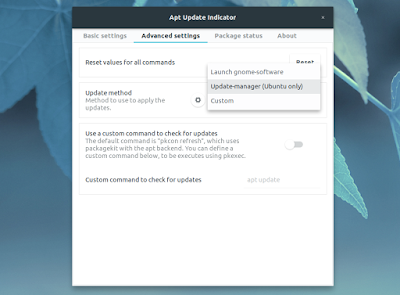Apt Update Indicator is a GNOME Shell extension that keeps you informed about available updates in Ubuntu GNOME / Debian.
Using it, you get a new icon on the GNOME Shell Top Bar which displays the number of package updates, while from its menu you can see exactly which updates are pending, apply the updates, and more.
The extension is a fork of Arch Update, a similar tool for Arch Linux, and it supports GNOME Shell from version 3.14 to 3.22.
Apt Update Indicator extension features:
- automatically check for updates at a configurable interval;
- optional updates count on the indicator;
- optional notifications when new updates are available;
- supports multiple updates methods: GNOME Software, Ubuntu Update Manager or custom, which can be used to directly run "apt upgrade", etc.
- can display new packages in the repository;
- includes options to display residual and autoremovable packages in the indicator.
The extension was updated recently to use GNOME Software or the Ubuntu Update Manager to apply the updates:
Another important change is the command used to check for updates. The extension now uses "pkcon refresh", which doesn't require the root password.
Previously, you either had to manually enter the password each time Apt Update Indicator checked for updates, or modify some system configuration files to allow the extension to check for updates without a password.
Other changes include:
- change the default terminal to xterm;
- use standard date formatting tools;
- automatic checks are now compatible across sessions;
- make use of symbolic icons to follow GNOME HIG.
Install Apt Update Indicator for GNOME Shell
The new "pkcon" command used by Apt Update Indicator requires "packagekit-tools" to be installed. To install it in Ubuntu or Debian, use the following command:
sudo apt install packagekit-toolsTo install the Apt Update Indicator for GNOME Shell, visit the GNOME extensions repository.
For installing the extension from source, bug reports, etc., see the extension GitHub page.



